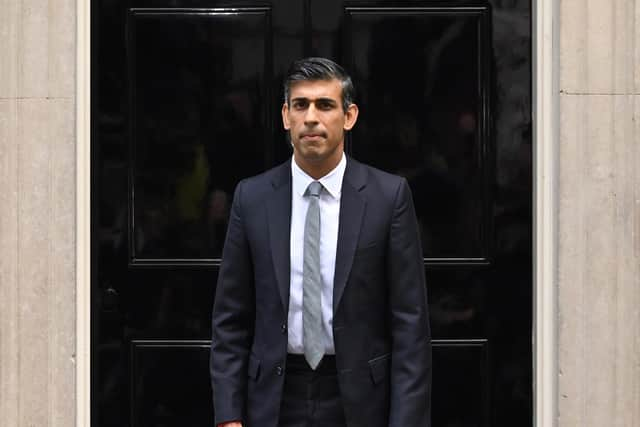Boris Johnson, Liz Truss and David Cameron: Book lifts the lid on Prime Ministers and over a decade in British politics from the heart of Westminster
Throughout that entire period one political party has remained in office – the Conservatives. So how, given such fractious events, have they stayed in power? It’s a question the Daily Telegraph’s political editor Ben Riley-Smith explores in his new book, The Right to Rule – Thirteen Years, Five Prime Ministers and the Implosion of the Tories.
Riley-Smith interviewed more than 100 people for the book including three former prime ministers David Cameron, Boris Johnson and Liz Truss, as well as a string of key political figures such as George Osborne, Philip Hammond, Ed Miliband, Jeremy Corbyn and Nigel Farage.
Advertisement
Hide AdAdvertisement
Hide AdAmong the many stories he tackles are the long road to the EU referendum and the sliding doors moments that led to Brexit, the collapse of Rishi Sunak and Boris Johnson’s relationship and Liz Truss’s brief spell as PM. “The idea was to look back at this whole 13-year run and try to make sense of it and pull together some of the threads,” says Riley-Smith, who is appearing at Raworths Literature Festival in Harrogate later this month.


“There’s been this cliché in British politics since I’ve been reporting that there is something ruthless about the Conservative Party and I wanted to test that and see if it was true, and I was surprised by how many people reinforced that idea. One thing a number of people said to me is ‘you have to understand the Tories are not an ideological party, they’re a power party.’ That doesn’t mean they don’t have broad values and principles they believe in like free markets, individual rights, and a cautiousness about the big state, but fundamentally they want to be in power.”
This, he feels, differs from Labour. “If you look at the Labour Party, it was founded with a demographic in mind to represent the working class and an ideology in mind which was to bring about democratic socialism. But the Tories are not anchored on either of those points which means they have an ability to shapeshift and change position to try and meet the public mood. The pursuit of power and the willingness to change to do what’s needed runs through the party like a stick of rock.”
One of the key narratives in British politics during this period is the rise and fall of Boris Johnson. So how did he go from winning an 80-seat majority in 2019 to being ousted from office by his own MPs less than three years later?
Advertisement
Hide AdAdvertisement
Hide Ad“It’s a very nuanced picture and I talked to 20 plus of his cabinet ministers and various people in Downing Street and some of them argue the pressures of covid mustn’t be underestimated, and the problems that put on the public finances, and taxes having to go up because spending had to be injected into the economy to prop it up during lockdowns,” says Riley-Smith. “But I think there were frailties and idiosyncrasies in his style of governing that are criticised by a lot of people who saw it firsthand, including Tory colleagues. One of them was that he didn’t often make quick, decisive decisions. He would allow policy discussions to go back and forth for weeks and weeks and he didn’t like telling a cabinet minister ‘no, I’m going to go against you.’ Possibly underpinning that was did he really have a deep, ideological view of how he wanted to change the country?”


Another remarkable political chapter examined in the book is Liz Truss’s calamitous premiership. Again he spoke to insiders with one referring to what they called “the Spinal Tap effect” and her desire to turn the dial up to 11 – “this idea that whatever we’re going to do, let’s do it bigger, bolder and quicker.”
“When she was a cabinet minister that could work because cabinet ministers need to negotiate with each other and the prime minister and their demands get watered down. But when you’re the prime minister there’s nobody there saying ‘no, turn it back down to 10 or 9.’ I think that ‘spinal tap’ attitude to policymaking explains why the mini budget ballooned in size.”
Riley-Smith says one of the most damning on the record quotes he got was from Kwasi Kwarteng. “He was her chancellor but also her right-hand man when it came to this tax cutting project and they were longtime political friends and he said to me, ‘I love Liz very dearly, I think she’s really principled, but if she didn’t blow up over the mini budget it would have been something else because her temperament wasn’t right to be prime minister.’ I’ve slightly paraphrased the quote but that’s quite a damning thing to have said of you by the person who is more than any other MP associated with your project.”
Advertisement
Hide AdAdvertisement
Hide AdAs someone who has worked at the heart of Westminster for more than a decade, how does Riley-Smith assess the last 13 years in British politics? “It’s been very significant and for one reason and that’s the B-word – Brexit. Whether you like it or loathe it I think everyone agrees it was a huge moment of change. The irony is it was something the Tory government at the time did not want people to vote for. So the biggest thing currently in their legacy is a policy that the UK government at the time did not want to bring about.”
Ben Riley-Smith is at The Crown Hotel, Harrogate, on Sat, Oct 21, at 4pm. Tickets £13. Book online at Raworths Literature Festival - Harrogate International Festivals or call the box office on 01423 562 303. The Right to Rule – Thirteen Years, Five Prime Ministers and the Implosion of the Tories, published by John Murray Publishers, is out now.